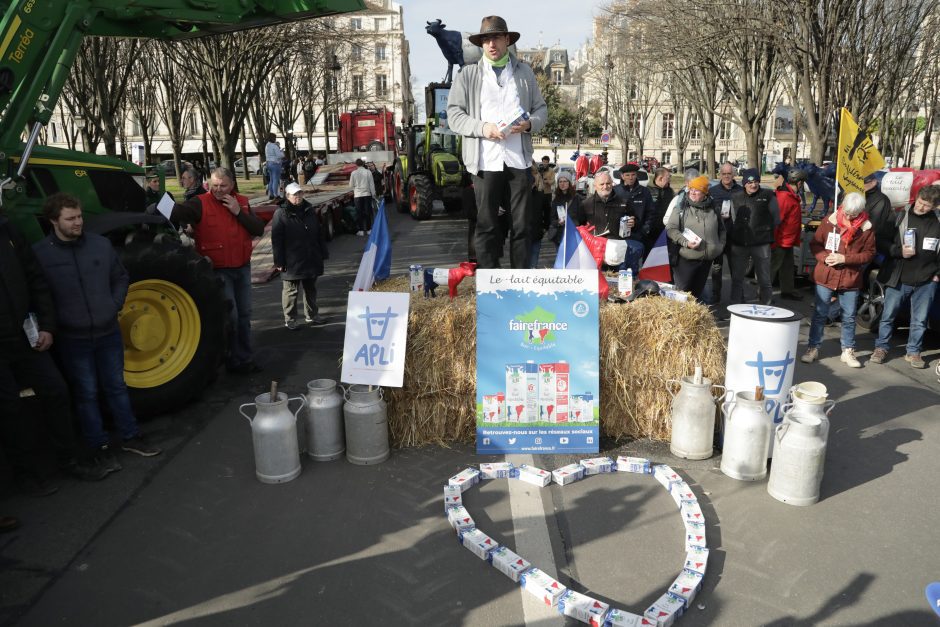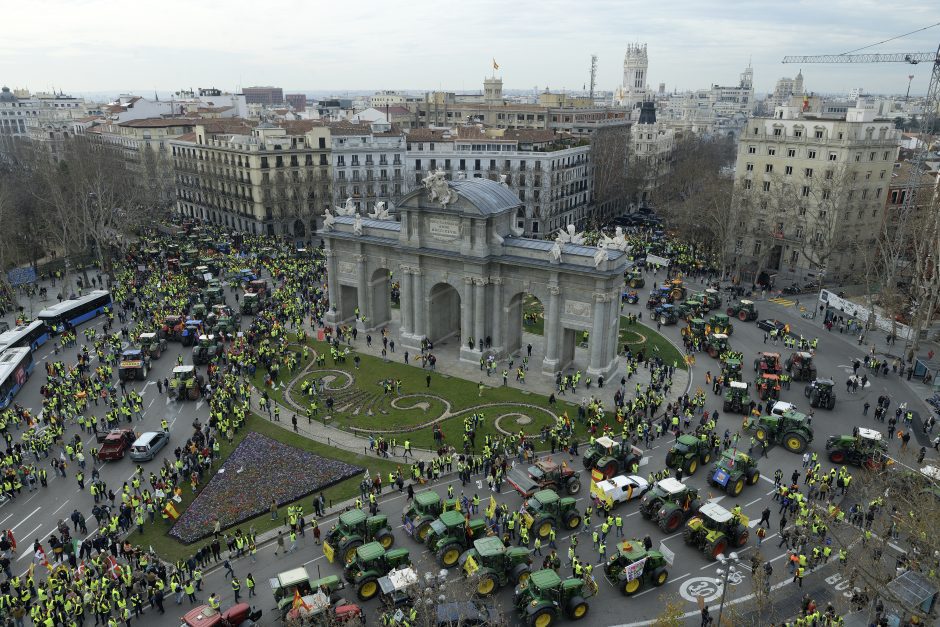Tensions over rising production costs, foreign competition and green regulation have sparked a wave of protests by farmers around the world, with EU countries a particular flashpoint.
Outside the EU, there have been violent clashes in India, where farmers have been demanding legally guaranteed minimum support prices (MSP) for their products. The protests come as the country is prepares for April’s general election, where PM Narendra Modi will seek a third term – with farmers forming an influential voting bloc.
Piyush Goyal, a minister in the Modi government, told the media: “We suggested a five year MSP deal between co-operatives NCCF, NAFED and farmers for purchasing pulses”. But the row shows no sign of abating.
Critics of MSPs say they fuel inflation and hurt small farmers by increasing the cost of the grain feed they buy. And, writing in Times of India, economist Prashant Prabhakar Deshpande says the policy causes environmental damage by encouraging monoculture of subsidised crops – degrading soil, harming biodiversity and depleting water tables.
Environmental concerns are at the heart of many of the policy changes disputed by farmers around the world, including restrictions in pesticides, expensive regulation and measures to reduce climate emissions. This discontent has been seized on by conservative politicians and media, prompting fears of a “greenlash”.
In the UK, there have been reports of farmers mounting tractor protests against the government’s Sustainable Farming Policy. But it’s not just green measures: British farmers are also unhappy over cheap imports that follow post-Brexit trade deals, and low supermarket prices.
The UK’s agri co-op sector has been keen to stress its environmental credentials, with players like dairies Arla and First Milk announcing net zero targets and Scottish agri co-op apex SAOS devoting its conferences in recent years to sustainability issues and concepts such as regenerative farming.
But some green measures have drawn disquiet from agri co-ops in the EU. A guest speaker at January’s SAOS conference, Nicolai Hansen, former CEO of Danish potato ingredient co-op KMC Amba, attacked Denmark’s 2040 vision to reduce cultivation areas, cut livestock numbers and impose carbon taxes on food, while energy companies are buying up land for solar and biogas.
“We know we will need food,” he said, “so what is the future?”
The measures – aimed at helping Denmark achieve its 2030 target of cutting greenhouse emissions by 70% from 1990 levels – could cut production by as much a fifth, farm groups warn.
“These models are based on something very disappointing, namely that climate reduction can only come by reducing production,” Peder Tuborgh, CEO of dairy co-op Arla, told Reuters. Tuborgh said new tech had helped Arla’s 9,000 farmers in Denmark, Sweden, England, Germany and Benelux reduce emissions by 1 million tons in two years.
“There is an innovation path,” he said. “We would like to continue that journey, rather than having to shut down.”

Across the EU, protests continue, and have already prompted a climbdown by European Commission president Ursula von der Leyen on plans to halve pesticide use. “Farmers need a worthwhile business case for nature-enhancing measures,” she said. “Perhaps we have not made that case convincingly.”
But pesticides are not the only bone of contention. On 30 January, French farmers blocked roads outside Paris demanding improved pay, less red tape and protection from foreign competition. One of their grievances is the EU’s Farm to Fork Strategy, a major part of the European Green Deal.
La Cooperation Agricole, an apex representing 2,100 French agricultural co-operatives, warns that French agricultural and food production risks being “knocked out” due to the increasing costs coupled with “a race for low prices”. It blames certain distributors for not taking into account rising production costs such as energy and wages, and urges them to work with the agricultural sector to find a solution.
The apex is also asking the French government to enforce the EGAlim laws, under which retailers can be fined up to 2% of revenues if they do not give French farmers fair prices.
“We cannot remain passive in the face of the weakening of our agricultural and agri-food production,” said Dominique Chargé, president of La Cooperation Agricole. “The price war waged by certain distributors is to the detriment of the contents of the French plate. We have made proposals, we now expect concrete and rapid measures from the government.”
French farmers also claim their products have to undergo higher quality control checks than those from other European countries. These claims were disputed by the president of Cooperativas Agroalimentarias, a Spanish federation of agricultural co-ops, Ángel Villafranca, who told El País that such comments risked negatively impacting the Spanish economy and agri-food producers.
Spanish coops have also complained that the protests and road closures in France are preventing their trucks from entering the country. But later in the month Spanish farmers took to the streets themselves – protesting EU sustainability rules while also calling for state support with the impact of climate change itself: Spain is suffering a prolonged drought.
Another sticking point is a trade agreement being negotiated by the European Commission with the Mercosur countries – Argentina, Brazil, Uruguay and Paraguay. A provisional agreement, reached in 2019, is yet to be ratified and France is threatening to block it.

Meanwhile, Copa and Cogeca, the two apexes representing European farmers and co-ops have weighed in on the situation. “Farmers across the EU have been severely impacted by extreme weather events and trade disruptions linked to the Russian invasion of Ukraine,” the apexes said on 31 January. “This has created difficulties for farmers in the Common Agricultural Policy (CAP) implementation, with repercussions for the 2024 agricultural year. Copa and Cogeca have repeatedly asked the European Commission to consider derogations from CAP conditionality, eco-schemes and agri-environment-climate commitments … We called for a common action to address these severe difficulties.”
The agricultural sector contributes 1.4% to the EU’s GDP, while accounting for 4.2% of the EU’s employment, and 14.3% of the EU’s greenhouse gas emissions. It benefits from EU funding through CAP, which represents 31% of the total EU budget, a figure many outside of the agricultural sector see as too high.
A total of €387bn (£331bn) in funding will be allocated to CAP for 2021-27, including support for climate change mitigation. France is the largest CAP recipient (17.3%), followed by Spain (12.4%), Germany (11.2%) and Italy (10.4%).
Other concessions from Europe following the protests include a “one-year derogation from CAP rules on fallow lands”. To receive CAP support, farmers must respect an enhanced set of nine standards beneficial to the environment and climate, which include devoting a minimum share of arable land to non-productive areas. The exemption will enable farmers to delay implementation and still be eligible for CAP.
Furthermore, EU farmers growing nitrogenfixing crops (such as lentils, peas, or favas) and/ or catch crops on 7% of their arable land will also be considered as meeting the requirement.
“Today’s measure offers additional flexibility to farmers at a time when they are dealing with multiple challenges,” said the European Commission’s president, Ursula von der Leyen. “We will continue to engage with our farmers to ensure the CAP strikes the right balance between responding to their needs while continuing to deliver public goods for our citizens.”
Copa and Cogeca welcomed the move but said the decision came too late in the agricultural calendar and “remains limited”. They said they will continue to engage with policymakers, adding: “We hope member states will further strengthen this proposal … especially in member states that have been particularly impacted by extreme climate events.”
The measure, which will be voted on by member states in committee meetings before being formally adopted, will apply retroactively from 1 January 2024.
On 1 February members of Copa and Cogeca met with Ursula von der Leyen and prime ministers Alexander De Croo (Belgium) and Mark Rutte (Netherlands). During the meeting, the farmers called for “fair prices”, less red tape and more protections for the sector.
One thing is certain: in an election year, these protests could play an important role in shaping not only the policies of European parties, but also the post-2030 policy framework.
“After the European elections, the next Commission will propose a revision of the EU Climate Law to make the EU 2040 Target legally binding,” said Copa and Cogeca on 6 February. “Europe’s farmers, forest owners and their co-operatives expect the new Commission to support the sector in continuing to deliver concrete actions to reduce their emissions, whilst feeding a fast-growing population and providing sustainable alternatives to fossil-based materials.”